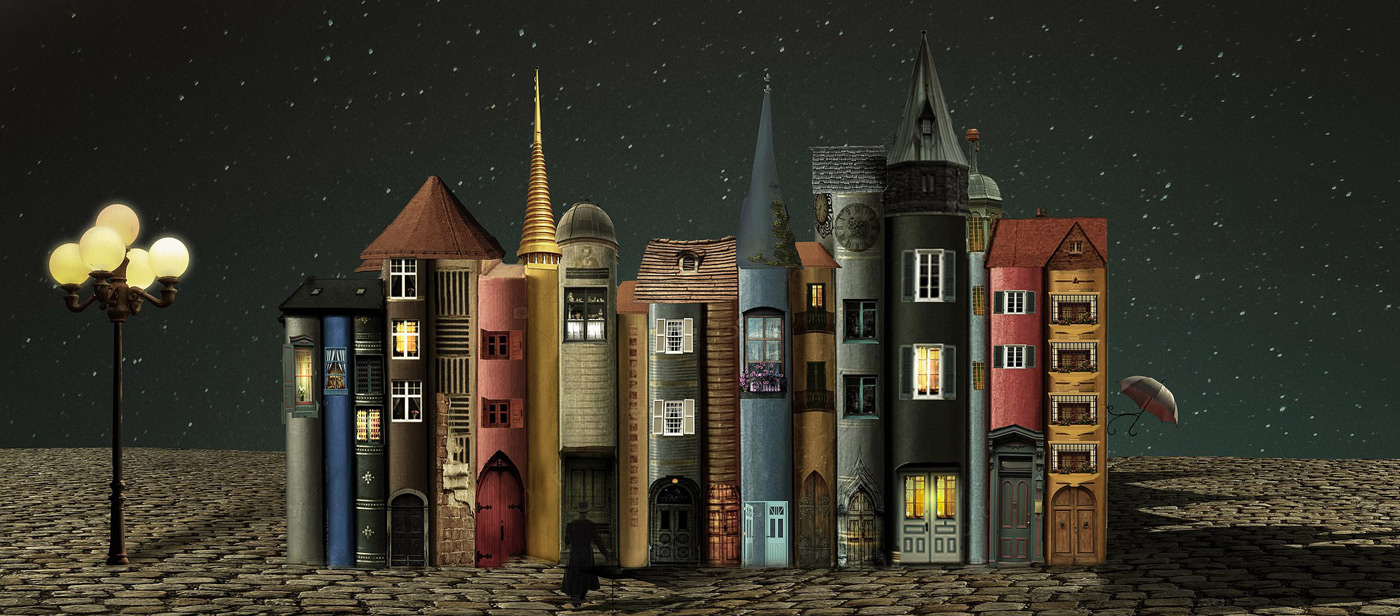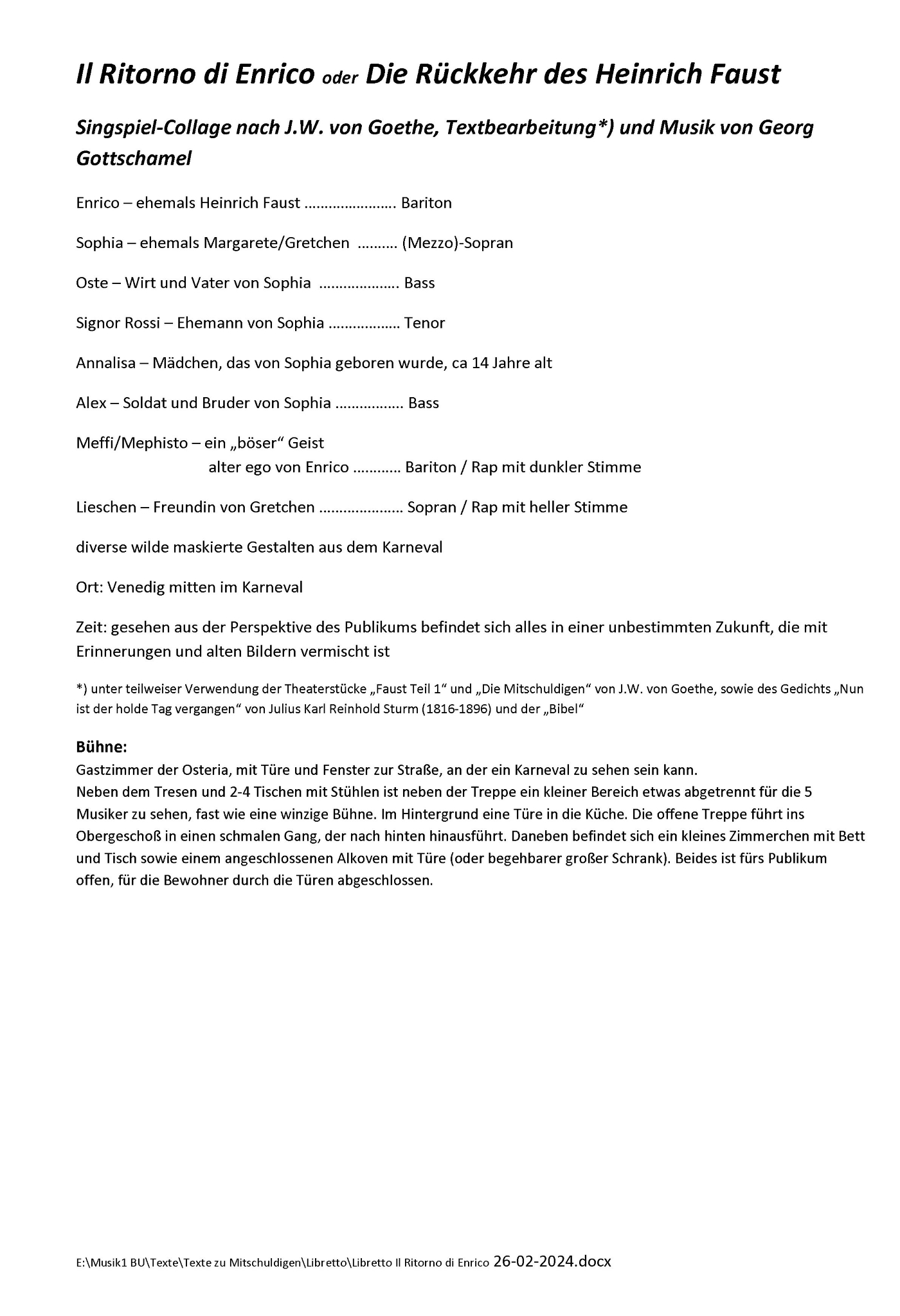
“Il Ritorno di Enrico” – “Die Rückkehr des Heinrich Faust”
Singspiel-Collage based on plays by J.W. von Goethe
Text, arrangement & music by Georg Gottschamel
The libretto is now available as a draft for reading
Further down you can find some explanations about the piece.
Background information about the project:
When I read the story of Sophie and Alcest, which Goethe gave us in several versions of the comedy “Die Mitschuldigen,” for the first time in 2004, I visualized it spontaneously being in Venice. The possibility of using this story as a reversal play to “Faust”, also by Goethe, led me to this project of a “Singspiel”.
First, I want to explain what I mean by the word reversal piece:
Reversal as a change in the direction of events, in the content of the narrative, in life, or in one’s attitude toward things, makes it possible to reverse a seemingly stalled old story in its consequence.
Some examples from the literature:
The drama in his play “Stella” was transformed into a tragedy by Goethe himself by changing only the last scene with the suicide of Stella and Fernando.
Changing the tragedy “Oedipus the King” by Sophocles could happen when Oedipus, after realizing that he is unknowingly married to his biological mother, says: “I’ll just divorce you!”. This transformation of a myth was described only briefly by Aldous Huxley in his novel “Iceland.” Of course, the social acceptance of such a reversal is very uncertain.
In the fairy tale “The Last of the Dragons” by Edith Nesbit, the princess succeeds in avoiding the traditional murder of the dragon by the prince – which could also be George – and wins both as friends.
For “Faust,” a change might be that Gretchen dares not kill the child, and she gets help from her father to raise the child. The devil’s magic within Faust is thus broken, and he is given the opportunity for reconciliation. He meets Margarete again as an adult woman. A love affair is ruled out because of the upright marriage.
Faust 1
Heinrich Faust impregnates Gretchen and kills her brother in a duel, mother dies of sleeping potion
Faust flees
Gretchen kills her newborn child
Faust returns to Gretchen’s dungeon in vain
Gretchen is executed
Die Mitschuldigen
Alcest loves Sophie
Sophie loves Alcest
He leaves her without further apparent reason, she continues to live with her father
She marries Mr. Soeller, the good-for-nothing
Alcest visits Sophie at her father’s
And so on
Reverse Play
Heinrich Faust impregnates Gretchen and kills her brother in a duel
Faust flees and wants to become rich
Mother dies, Gretchen moves with her newborn daughter to her father’s osteria, who lives separately.
There she calls herself Sophia
She marries a certain Signor Rossi
Enrico, Heinrich Faust, who has become rich, looks for her and takes a room in her father’s inn.
And so on
So is it nonsense to say that forgiveness is possible?
Mankind will not get around it, even if it would be more convenient for the strong to hold on to preconceived concepts about people and their past without forgiveness. These then determine our behavior in encounters with other people or groups. By identifying people with their past, we block the way to the future. Such a system of attitudes and procedures will certainly be able to generate comfort and survival as well as reproductive opportunities for the rich/strong for a longer time, but it will then eventually collapse. Every system absolutely attached to special own ideas has collapsed yet. That would be a long list, Babylon, Alexander, Rome, Charles dG, Napoleon, Papal States, Nicholas, Habsburgs, NSDAP, Soviet Union ….without guarantee of completeness. What is next? The possibility just exists that thereby the limits of the survivability are exceeded, by abuse of weapons, by open war or a revolution of the masses of people, and that there are then no more people.
Note to Berta von Suttner
She initiated and achieved many things, at least in the European environment on the long detours of two world wars. Globally, however, there is still a long way to go for mankind. Outside our narrow Western Europe there are still “wars” in various forms. Therefore, even in our country, the long-term survival of mankind is doubted by many people. The rapid development of the disproportionate distribution of resource consumption within the framework of the growth ideology also worries me. My conversations about the civil war in Syria with a refugee and the political development in Europe show a polarization that is frightening.
It is only clear to me that the function of war (struggle within a species) as the father of all things is very dangerous. This fight within a species belongs apart from smaller, the reproduction serving fights with animals, probably to the development history of humans particularly. A change by change of consciousness in the direction of a cooperative life is necessary, but probably protracted. I wanted to thematize the forgiveness work which is also necessary for this.
Note to „Iphigenie en Tauride“ (Ch.W.Gluck)
Commentary in the Österreichische Musikzeitschrift 5/2010, page 56 (Walter Dobner):
The original version of the libretto (N.F.Guillard) with the murder of Thoas by Pylades was changed by director Torsten Fischer, in the spirit of Goethe’s drama. The message would then be: humanity is always possible.
Note on linguistic style changes – long and short wavelength
The epoch question has been one of the central points in planning from the beginning. Within the formal time span of (classical) 24 hours, my goal of time independence was difficult. It was clear to me from the beginning that the time reference had to be broken up. The attempt to let the living child speak in the language of Goethe by reversing the story – even if I had succeeded in doing so – would only have produced unintentionally comical results. So I made a virtue out of necessity: linguistic style changes put time into perspective. These take place at the points where it is about the daughter and the circumstances of her emergence, apart from the preceding and following comments spoken by the grandfather. The latter could also be spoken by a completely different actor. But I don’t find that so exciting and theatrical. The rest is Goethe text with the changes necessary to me from my musical feeling. The linguistic fluctuations thus reflect the uncertainty of the reference to time, and are necessary in this sense to emphasize the “untimeliness” of forgiveness. The round of forgiveness that takes place at the end is not, of course, the end of the story. How it plays out, the viewer is then left to imagine for himself. I was happy to leave Enrico/Alcest’s surely flawed repentance, which seems understandable in the original due to the lack of serious guilt, as it offers a good approach to questioning the conditions for forgiveness. Is repentance as an admission that something bad has happened necessary for forgiveness? Anyone who wants to can read about this in Colin Tipping’s book. I put this into the girl’s mouth, that is, into the letter.
Following hints from readers, I strengthened the collage idea by inserting original sequences from Faust, also to improve the comprehensibility of the plot. The latter was perhaps nonsensical, but the last version is for me an optimum within my possibilities.
Note on the translation of the word “logos” in Goethe and the dichotomy “word-image” in Schönberg
The ambiguity of every natural science is already shown in the term formation of electrodynamics and quantum mechanics: Light as an example for our ignorance, what it is, wave or particle. These are words=concepts, which are “explained” by mathematical connections. But for both there are also the vivid imaginable “things” from the experience – water waves and objects, which give us a picture. Goethe in Faust 1 lets Faust translate the word/logos thus: In the beginning was the deed (verse1237).
Action/Technique – Deed – Image – Logos – Word – Theory – Mathematics
In the opera “Moses and Aron” Arnold Schoenberg thematizes the relationship between the thought of a single God and its shaping in the outer life of humans. Two juxtapositions came to mind. As Michael Gielen said in an interview with Jonathan Ellis: “The contrast between Moses and Aron is fictitious. They are two sides of the same coin. What good is the idea if it is not realized.” (quoted from the supplement to the record of “Moses and Aron” by Philips 6700 084)
In the text of the third act, Schönberg then writes:
Quote:
Aron: ….. Where the word and the image of the mouth fail ….!
Moses: … then only the deed, the action was sufficient for you?
….. So you won the people not for the Eternal One, but for yourself …
Aron: For its freedom, that it might become a nation!”
Deed – image – ineffable God – thought – word – politics
The strange coincidence with Goethe at “Tat” is no coincidence, even if Schoenberg did not know Goethe’s Faust.
Golden calf – nameless spirit – war god Yahweh
Two sides of the coin
Happiness as the middle between sorrow and cheerfulness,
without clinging to or opposing one of them
To be sad — to be happy — to be cheerful
